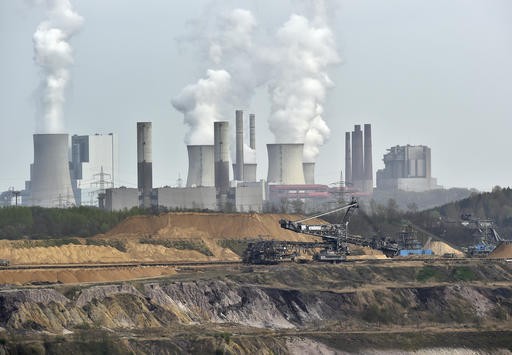Popular Reads
Top Results
Can't find what you're looking for?
View all search resultsPopular Reads
Top Results
Can't find what you're looking for?
View all search resultsParis climate agreement becomes international law
Change text size
Gift Premium Articles
to Anyone
T
he Paris Agreement to combat climate change becomes international law on Friday — a landmark demonstrating that countries are serious about tackling global warming amid growing fears that the world is becoming hotter faster than scientists expected.
So far, 96 countries, accounting for just over two-thirds of the world's greenhouse gas emissions, have formally joined the accord, which seeks to limit global warming to 2 degrees Celsius (3.6 degrees Fahrenheit). Many more countries are expected to come aboard in the coming weeks and months.
UN spokesman Stephane Dujarric said Secretary-General Ban Ki-moon plans to commemorate "this historic day for both the people and the planet" by holding a conversation with civil society organizations about how they can contribute to the objectives of the Paris agreement.
"For years, he warned that we are the first generation to really feel the effects of climate change - and the last that can meaningfully prevent its worst consequences," Dujarric said. "His push for action was backed by government officials, scientists, faith leaders, business executives and civil society activists around the world who understood that the future of our common home is at stake. They made today possible."
Scientists praised the speed at which the agreement, signed by 192 parties last December in Paris, has come into force, saying it underscores a new commitment by the international community to address the problem which is melting polar ice caps, sending sea levels rising and transforming vast swaths of arable land into desert.
"It took more than seven years for the Kyoto Protocol to go into effect while less than a year for the Paris climate agreement to achieve the same," said Dr. Feng Qi, executive director of the School of Environmental and Sustainability Sciences at Kean University in New Jersey. "While the real effect of the agreement after it goes into effect is still uncertain, it is a simple sign that the international society is much more open to alter economic and political behavior to control climate change, which is by all means positive."
But scientists and policy makers say the agreement entering into force is just the first step of a much longer and complicated process of transitioning away from fossil fuels, which currently supply the bulk of the planet's energy needs and also are the primary drivers of global warming.
"Climate change is a marathon not a sprint and the agreement sets a course for the marathon in the years ahead," said David Sandalow, inaugural fellow at the Columbia Center on Global Energy Policy and a former under-secretary of energy in the Obama administration.
While the Paris agreement is legally binding, the emissions reductions that each country has committed to are not. Instead, the agreement seeks to create a transparent system that will allow the public to monitor how well each country is doing at meeting its goals in hopes that this will motivate them to transition more quickly to clean, renewable energy like wind, solar and hydropower.
The agreement also requires governments to develop climate action plans that will be periodically revised and then replaced with new, even more ambitious, plans. Many of these details will begin to be addressed at the COP22 meeting next week in Marrakech, Morocco.
France's UN Ambassador Francois Delattre said he remained optimistic that the agreement signed in his country's capital would foster change.
"The challenge we have in front of us is unprecedented. We need a massive reorientation of global public and private investment toward a low carbon economy," Delattre said, adding that he was encouraged by a series of meetings with the business leaders.
"They understand that there's a major shift here. They want to be part of it, both to reduce the cost but also to increase their opportunities," he added.
Still, there are those who worry that for all the speed at which the Paris Agreement has been approved it may still be too late.
A report by the UN Environment Program released Thursday projects that annual emissions must be kept below 42 billion tons of CO2 (carbon dioxide) by 2030 for the world to have a chance to meet the goals set out in the Paris agreement. However, the agreement itself foresees emissions reaching 54 billion-56 billion tons in 2030, setting the world on a course to exceed the goal of limiting warming to 2 degrees Celsius (3.6 degrees Fahrenheit).










